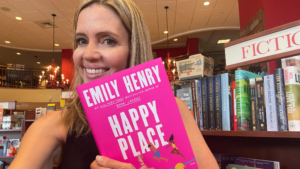When I can name an emotion, I can understand it better. And understanding what’s happening in my head helps me find ways to live a happier life. And let’s face it, we could all stand to be a little happier.
Let’s start from the beginning: I heard of the emotion “schadenfreude” for the first time while sitting in the audience of the hilariously wonderful Broadway show Avenue Q. They wrote a song pointing out the incredibly awkward emotion, in a song aptly named “Schadenfreude”.
It’s the emotion you feel when you get pleasure from another person’s misfortune. I mean, we all know those videos of dads teaching their kids t-ball and getting hit in the nuts. We’ve all laughed at them, right?
But if schadenfreude is taking pleasure in someone’s misfortune, can you take pleasure in someone’s joy? Enter freudenfreude. The counterpart of schadenfreude, it’s a German-sounding word made up by social scientists to describe the emotion of finding joy in other people’s happiness. And apparently, being happier for other people… can make us happier in our own lives. We tackle all of this in today’s podcast.
Sharing Happiness Makes You Happier
There have been studies that show that sharing in other people’s joy can improve your own life satisfaction, it can boost your resilience, and help build skills for dealing with conflict. On this week’s podcast, we had Dr. Catherine Chambliss teach us how to practice more freudenfreude. A Professor of psychology, who has taught at Ursinus College since 1979, Dr. Chambliss is credited with coining the phrase freudenfreude and using it to ease depression.
Dr. Chambliss shared some of the benefits of freudenfreude and easy practices to include it in our lives. Something as simple as asking a friend to detail their vacation lets them almost have a second vacation by getting to relive the joyous and happier moments.
The Good With The Bad
I told Dr. Chambliss that it seems when I hang out with my friends, we just commiserate and complain. Dr. Chambliss shared, “It kind of makes sense in a lot of friendships, commiserating is dominant because commiserating is a wonderful way of dampening competition.” She encouraged celebrating my friend’s successes but that commiserating, and even envy, are healthy emotions. It’s really about the balance of it all.
Dr. Chambliss says even if you aren’t feeling that joyous about someone else’s success…fake it! Even acting out emotions can help jumpstart those happier feelings in your system. We talk more about envy, frenemies, and even emojis on this week’s episode. Listen with the links below and let us know what you think!
- Acast: https://open.acast.com/
public/streams/ 618c3caaa322d1001350082c/ episodes/ 65fce0c920f30d0016ffe646.mp3 - Apple Podcasts: https://podcasts.
apple.com/us/podcast/the- holderness-family-podcast/ id1378725018?i=1000650459424 - Spotify: https://open.spotify.
com/episode/ 6hvUMm84RRNs1E28LzPS8P?si= 3b6afe3de5904d05 - Pandora: https://pandora.app.
link/1n0a5mKshIb
- Amazon: https://music.amazon.
com/podcasts/094464e9-aad9- 4b09-8ee8-248c76b48bd6/ episodes/28a4d08b-ec7e-4776- af1b-725858e79753/the- holderness-family-podcast-we- all-need-more-freudenfreude- with-dr-catherine-chambliss




